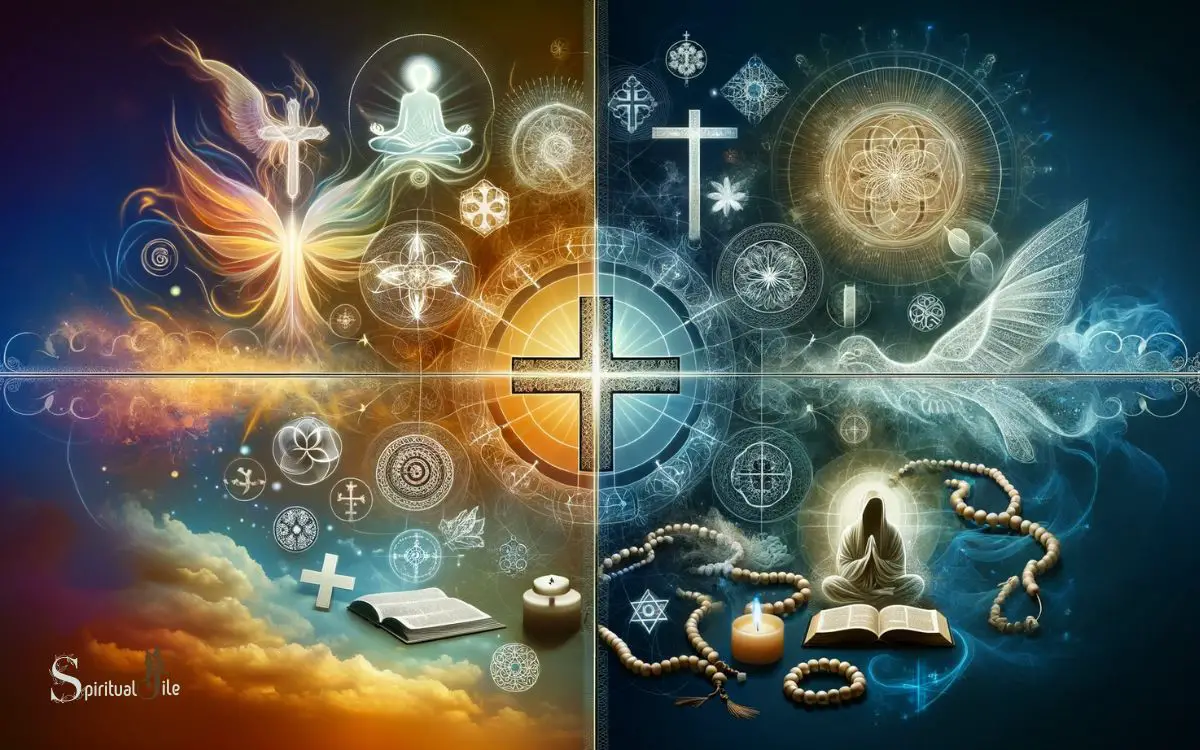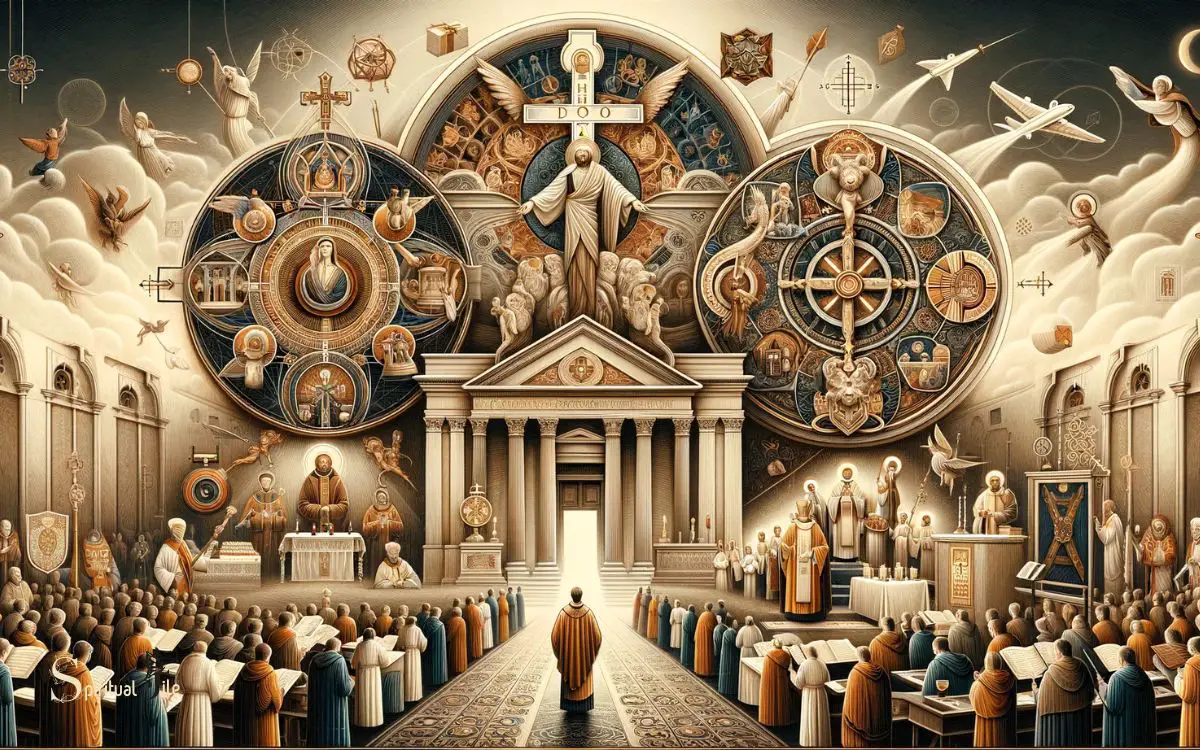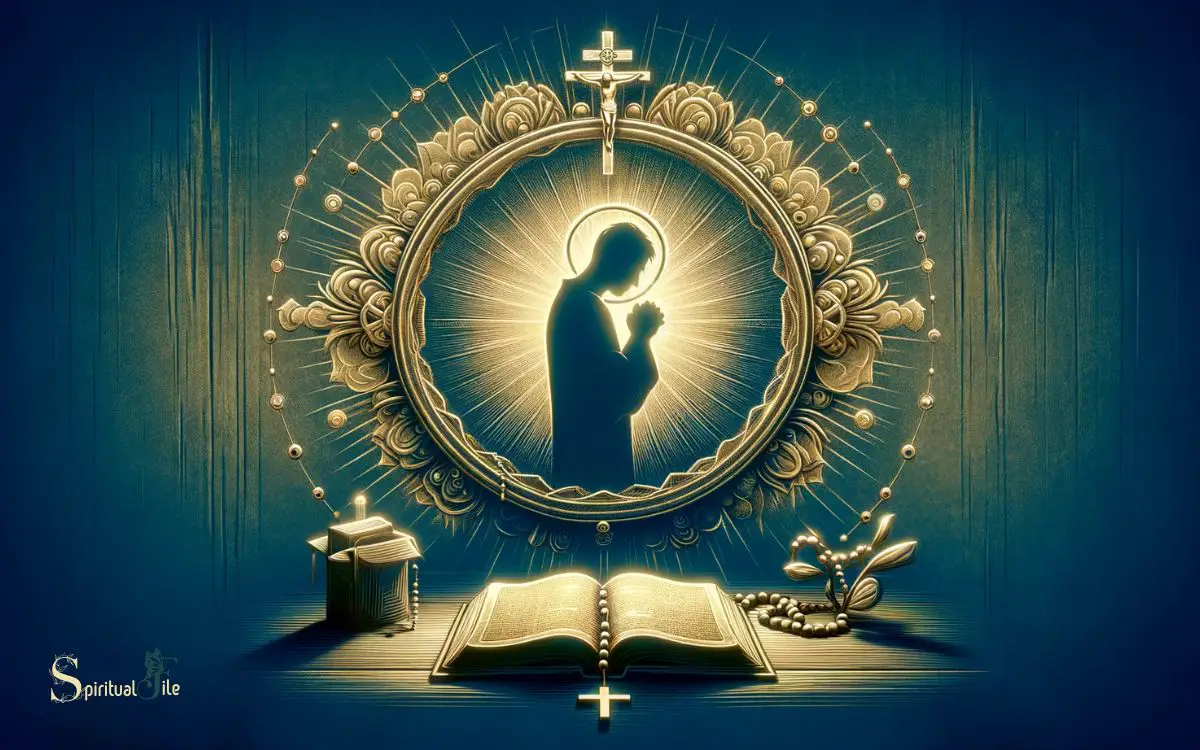Spiritual Vs Religious Catholic: Prayer!
In the context of Catholicism, spirituality often refers to an individual’s personal experience and relationship with God, which may include prayer, reflection, and actions aligned with one’s beliefs.
Religion, on the other hand, pertains to the organized practices, doctrines, and communal aspects of the Catholic Church. While spiritual practices can be private and self-directed, religious activities are typically communal and adhere to established traditions within the Church.
Spirituality within Catholicism emphasizes a personal connection with the divine and focuses on the inner life and personal moral development. It can manifest in various ways, such as through meditation, reading scripture, or engaging in acts of service inspired by one’s faith.
Religion in Catholicism involves participation in the sacraments, attending mass, following the liturgical calendar, and being part of a parish community. It is rooted in tradition and often involves rituals and ceremonies that have been passed down through generations.
Spirituality:
- Personal relationship with God
- Inner moral development
- Individual practices
Religion:
- Communal worship and sacraments
- Adherence to Church teachings
- Participation in Church traditions
The interplay between spirituality and religion in Catholicism is integral to the faith’s expression, with spirituality providing the heart’s connection to God and religion offering a communal framework for worship and service.

Key Takeaway
7 Aspects: Spiritual Vs Religious Catholic
| Aspect | Spiritual Catholic | Religious Catholic |
|---|---|---|
| Focus | Personal relationship with God | Adherence to Catholic doctrine |
| Practices | Emphasis on prayer, meditation | Participation in sacraments, rituals |
| Interpretation | Flexible interpretation of faith | Adherence to Church’s teachings |
| Community | May not attend church regularly | Regular attendance at Mass and rituals |
| Role of Clergy | May seek guidance but less formal | Follows guidance of clergy and hierarchy |
| Engagement in Traditions | May choose selective involvement | Active participation in Catholic traditions |
| Spirituality | Emphasis on individual spiritual growth | Spirituality within Catholic framework |
Definition of Spiritual and Religious

The distinction between being spiritual and being religious can be elucidated by examining their respective definitions and implications within the Catholic faith.
Being spiritual encompasses the personal relationship and connection with the divine, often involving a quest for meaning, purpose, and inner peace. It focuses on individual experiences, beliefs, and practices that nourish the soul.
On the other hand, being religious typically involves adherence to organized doctrines, rituals, and traditions within a specific faith community, such as the Catholic Church. It emphasizes communal worship, adherence to religious laws, and participation in sacraments.
While spirituality can exist independently of organized religion, religious individuals often integrate spiritual experiences into their religious framework.
Both aspects are valued within Catholicism, with the Church providing guidance for individuals seeking to deepen their spirituality within a religious context.
Role of Tradition in Catholicism

In understanding the role of tradition in Catholicism, it is important to recognize its significance both within the framework of spirituality and religious practices.
Tradition in Catholicism encompasses various aspects that contribute to the richness of the faith, including:
- Doctrinal Preservation: Tradition serves as a means of preserving and passing down essential teachings and beliefs through generations.
- Liturgical Practices: It shapes the forms of worship, sacramental celebrations, and rituals that have been observed for centuries.
- Community Cohesion: Tradition fosters a sense of unity and continuity among Catholic communities worldwide.
- Connection to History: It provides a link to the historical roots of the Church, honoring the contributions of past generations.
Understanding the multifaceted role of tradition is crucial in comprehending the depth of Catholic spirituality and religious practices. This foundation leads us to explore the personal connection with God in the Catholic faith.
Personal Connection With God

Understanding the multifaceted role of tradition in Catholicism leads to exploring the personal connection with God through spiritual practices and religious rituals. Both spiritual and religious Catholics seek a deep, personal relationship with the divine.
This connection is nurtured through various means, as illustrated in the table below:
| Spiritual Practices | Religious Rituals |
|---|---|
| Meditation | Mass attendance |
| Prayer | Confession |
| Retreats | Sacraments |
| Spiritual reading | Rosary |
| Contemplative practices | Pilgrimages |
Engaging in spiritual practices allows individuals to commune with God on a personal level, while participating in religious rituals provides a sense of community and tradition.
Both avenues contribute to the individual’s personal connection with God, enriching their spiritual journey within the Catholic faith.
Community and Social Engagement

One essential aspect of community and social engagement for Catholics is active participation in charitable initiatives. This involvement allows individuals to live out the teachings of Jesus by helping those in need and serving as a positive force in the community.
In addition to charitable initiatives, Catholics engage in various forms of community outreach and social activism, including:
- Volunteering at local shelters and food banks to assist the homeless and hungry.
- Participating in advocacy efforts for social justice and human rights issues.
- Supporting and organizing fundraising events for community development projects.
- Engaging in interfaith dialogue and collaboration to promote understanding and unity among diverse religious communities.
Through these actions, Catholics demonstrate their commitment to building a more just, compassionate, and inclusive society.
Impact on Catholic Practice

Spiritual Catholics often emphasize a personal relationship with God, seeking meaning, purpose, and connection with the divine. Their practice may involve meditation, contemplation, and a focus on inner transformation.
This can lead to a more individualized approach to Catholicism, with a greater emphasis on personal prayer, spiritual growth, and seeking God’s presence in everyday life.
On the other hand, religious Catholics often place importance on traditional rituals, sacraments, and communal worship within the Church.
Their practice may involve regular attendance at Mass, participation in the sacraments, and adherence to Church teachings and traditions.
Both spiritual and religious beliefs play a significant role in shaping the diverse practices within the Catholic faith community.
What Is the Role of Prayer in the Spiritual Vs Religious Catholic Debate?
Prayer plays a crucial role in the spiritual and religious practices of the Catholic faith. For the spiritual, it serves as a means of personal connection with the divine, while for the religious, it is an essential ritual prescribed by the Church. The debate lies in whether prayer should be a personal or communal practice.
FAQ About Spiritual Vs Religious Catholic
How Does the Catholic Church View the Concept of Spirituality and How Does It Differ From Religious Practices?
The Catholic Church views spirituality as one’s personal connection with the divine, often involving prayer, meditation, and reflection.
Religious practices, on the other hand, encompass the formal rituals, sacraments, and communal worship prescribed by the Church.
What Are Some Common Traditions Within Catholicism and How Do They Impact the Spiritual Lives of Catholics?
Common traditions within Catholicism, such as the Mass, sacraments, prayer, and devotion to saints, play a crucial role in shaping the spiritual lives of Catholics.
These practices provide a framework for personal and communal spiritual growth and connection to God.
Can Individuals Have a Personal Connection With God Outside of Traditional Religious Practices Within Catholicism?
Yes, individuals can have a personal connection with God outside of traditional religious practices within Catholicism.
This may involve personal prayer, meditation, and seeking spiritual experiences that align with their beliefs and values.
How Does the Catholic Community Engage With Social Issues and What Is the Significance of This in the Spiritual Lives of Catholics?
The Catholic community engages with social issues through advocating for justice, compassion, and human dignity.
This engagement is significant in the spiritual lives of Catholics as it reflects their commitment to living out the teachings of Christ in the world.
In What Ways Does Spirituality Impact the Daily Practices and Rituals of Catholics, and How Does It Differ From Religious Observances?
Spirituality impacts the daily practices and rituals of Catholics by guiding personal connections with the divine, fostering inner growth, and influencing ethical choices.
It differs from religious observances by emphasizing individual experiences and beliefs.
Conclusion
The distinction between spiritual and religious in Catholicism is significant. While religious practice is often tied to traditional rituals and beliefs, spiritual connection focuses on the personal relationship with God and engagement with the community.
This can be seen in the case of Maria, who finds solace and strength in her personal prayer and meditation, while also actively participating in her local Catholic community to support those in need.






